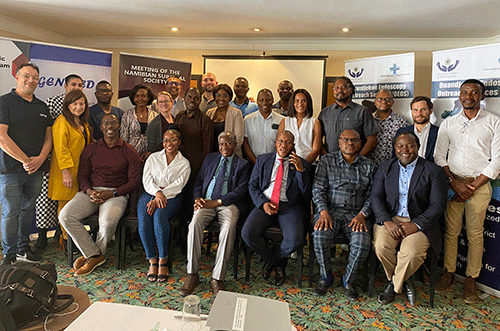Medical professionals from the Onandjokwe and Oshakati state hospitals recently received the third round of training on how to operate laparoscopic towers and instruments since receiving the equipment in 2017 from the health ministry to improve surgery in healthcare facilities.
Specialist surgeon and medical superintendent Dr Akutu Munika told Vital Signs the training is necessary to advance and improve surgical services rendered in hospitals.
“Basic laparoscopic procedures can be done. Only more advanced laparoscopic procedures require even more high-tech equipment, which we might not have in our state hospitals – and in these cases, the ministry has provided special funds for it,” said Munika, who recently attended the Global Laparoscopic Advancement training in Ondangwa.
GLAP is a programme that helps expand laparoscopic surgery, performed through small incisions, instead of one large incision to places where the capacity may not fully be developed.
He noted that the Namibian Surgical Society started this journey of training in 2018, adding, “We had similar workshops in 2018 and 2019, which were conducted by South African experts. This year, we had a group of American and Argentinian experts to facilitate this year’s workshop. We learned a lot”.
The aim of GLAP is to provide tools for local surgeons to build sustainable change in their educational infrastructure. It also hopes to standard laparoscopic surgery skills, safety and proficiency. Furthermore, resources are given to help build simulation hubs in the country.
Laparoscopy or keyhole surgery is a type of operation in which doctors use a viewing telescope (laparoscope) to look at the organs inside the abdomen and the pelvis. The image of the organ is magnified many times larger than in real life, with the help of powerful light sources, cameras and video monitors.
Munika highlighted that in Namibia, laparoscopic appendectomy is performed to remove the appendix, laparoscopic cholecystectomy to remove the gall bladder while diagnostic laparoscopy is used to assess the abdomen.
The training harnesses new technologies and innovations, which speaks to the impact of the Fourth Industrial Revolution. The exercise is offered to clinical specialists, registrars and medical officers here in northern Namibia to build capacity in this area, which will ultimately lead to improved surgical outcomes for our patients.
Health ministry executive director Ben Nangombe said Namibia continues to leverage Fourth Industrial Revolution technologies to build capacity in the public health sector and that the line ministry is cognizant that they need to build strategic partnerships to successfully and sustainably leverage these technologies.
“I am delighted that the Society of American Gastrointestinal and Endoscopic Surgeons (SAGES) has embarked on this journey with Namibia to provide support in training our clinicians on Minimal Invasive Surgery,” he said.
Nangombe added: “We will continue to support this cause all people in Namibia deserve to receive unhindered access to reliable and modern healthcare comparable to what is available in other parts of the world, including industrialised countries. Therefore, we shall continue to support initiatives like this training workshop on minimal invasive surgery”.


